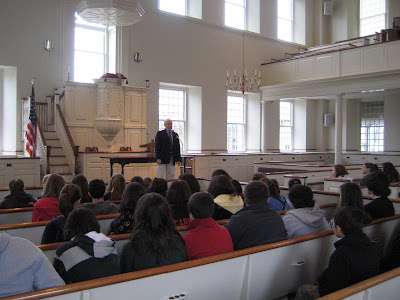L
ast week the Project Lucid classes visited the Mark Twain House in Hartford, CT. We had a wonderful day, filled with new friendships and new learning on Mark Twain, the writer. Read the excerpt below from “The Autobiography of Mark Twain.” In this exerpt, Twain recollects what slavery was like in his home town of Hannibal, Missouri when he was a young boy.
(Historical Note: The first enslaved Africans were forcibly taken from their family and home and transported by ship in chains to America in the late 16oos. Once in the colonies they were needed to work on tobacco and rice plantations. By the 18th century slavery was deeply a part of the American way of life, both in the North an the South. By the early 19th century the Northern states would end slavery, but in the South, in places like Hannibal, Missouri, slavery was still legal. In the “deep South” in places like Mississippi, Louisiana and Georgia, many slaves worked on cotton plantations and labored from sun up to sun down picking cotton for their masters, so that it could be cleaned and sent to Northern textile mills to make clothes. Slavery ended in all of the United States in 1865 with the end of the Civil War.)
Memories on Slavery
From “The Autobiography of Mark Twain”
“At first my father owned slaves but by and by he sold them and hired others by the year from the farmers. For a girl of fifteen he paid twelve dollars a year….for a negro woman of twenty-five, as a general house servant, he paid twenty-five dollars a year…for a strong negro woman of forty, as cook washer, etc. , he paid forty dollars a year…and for an able-bodied man he paid from seventy-five to a hundred dollars a year..
All the negroes were friend of ours, and with those of our own age we were in effect [friends.] I say in effect,..We were [friends] and yet not [friends]; color and condition [created] a subtle line which [both of us] were conscious of and [allowed] complete [togetherness] impossible…
In my schoolboy days I had no [strong feeling of dislike] to slavery. I was not aware that there was anything wrong about it….The local papers said nothing against it; the local [churches] taught us that God approved of it, that it was a holy thing and that the doubter need only look in the Bible if he wished to settle his mind-and then the texts were read aloud to us to make the matter sure; if the slaves themselves had a [dislike of slavery] they were wise and said nothing. In Hannibal we seldom saw a slave misused; on the farm never.
….There was nothing about slavery of the Hannibal region to [make people feel in their heart that slavery wasn’t right and to do something about it]. It was the mild domestic slavery, not the brutal plantation [slavery.] Cruelties were very rare and…very unpopular. To separate and sell members of a slave family to different slave masters was a thing not well liked by the people and so it was not often done… I have no recollection of ever seeing a slave auction in that town…..I vividly remember seeing a dozen black men and women chained to one another, once, and lying in a group on the pavement, awaiting shipment to the Southern slave market. Those were the saddest faces I have ever seen.
The slave trader was [hated] by everybody. He was [thought of] as a sort of human devil who bought and [transported] poor helpless people to hell-for to our whites and blacks alike, the Southern plantation was simply hell; no milder name could describe it.”
Response to Literature “Memories of Slavery” by Mark Twain.
- Describe the relationship between the young Mark Twain and the slaves on his farm who are his own age.
- Why did Mark Twain’s mom let the slave boy Sandy sing all day?
- How was slavery in Hannibal, Missouri different from slavery “down the river” in the Southern plantations?
- Reread the passage on the slave boy named Sandy. Make a text to self connection between Sandy and you. What is similar in this passage to your life? What is different in this passage to your life?








